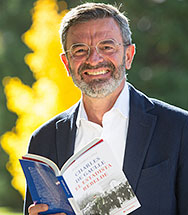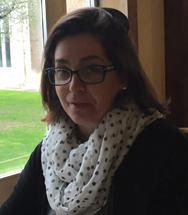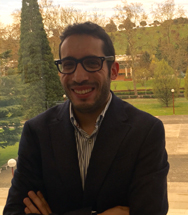The statesman's hope: Charles de Gaulle in French History
El profesor Pablo Pérez López ha presentado su último libro, <i>Charles de Gaulle. El estadista rebelde</i>, en el seminario del Grupo de Investigación en Historia Reciente (GIHRE)

Professor Pablo Pérez López, Full Professor of Contemporary History of the School of Philosophy and Letters, presented his latest book, Charles De Gaulle. El estadista rebelde, in a seminar of the group of research in Recent History (GIHRE) of the University of Navarra. On the occasion of the fiftieth anniversary of the death of the French president, he said that he gave France back the hope it needed to remain a European power.
In his speech, Pérez López reviewed the main milestones in the biography of the general and French president (1959-1969) and focused on the reasons that have made him a symbol of the French 20th century. De Gaulle combined intelligence, decisiveness and luck at crucial moments in the life of France. Moreover, his arrogance and the confidence that history had reserved for him a special mission statement motivated him to seize, at every moment, the opportunity to guide his country.
During the Great War, wounded and captured, locked up in a prison camp, he tried to escape on numerous occasions, because he thought that his country needed him. On the other hand, he believed that victory could not be firm if it was not rooted in a moral position. For this reason, he turned his political and military career into a struggle for legitimacy, which led him, for example, to consider that the German defeat in the Great War was a consequence of the imposition of militaristic criteria on civilian life, with the consequent degradation of the political.
De Gaulle, faced with events such as the French withdrawal in the early stages of the Second World War or the May 1968 revolution, was an idealist who, in the words of Professor Perez, was capable of "wishing for the opposite of what is happening and making it happen". Thus, during the Second World War or the May events, he wanted to embody the legitimacy of France and, in the time of peace, he proposed a political project that would unite the French around the possibility of their greatness.
On the other hand, he also thought that "there is no politics outside realities", which explains why he made the much discussed decision to leave Algeria; or why he considered that peoples endure beyond ideologies and tried to limit the power of French political parties. He also wanted to reconcile Catholicism with the Republic and, in the end, with the simplicity of his realism, he decided to be buried in the small rural cemetery of the village to which he retired.
At seminar of the GIHRE, Professor Pérez López, director of department of History, Art History and Geography of the School of Philosophy and Letters, delved into the current significance of Charles De Gaulle, whom he considers "the repository of what we do not have, but long for": coherence, the ability to nobly assume the past and offer a well-founded position in the face of historical events, and, finally, a sense of the common good that makes it worthwhile to offer even one's own life.



